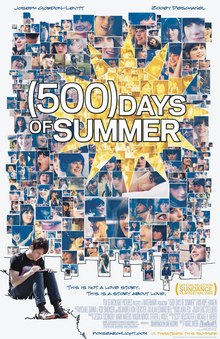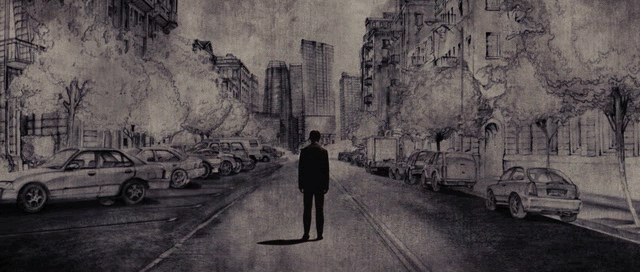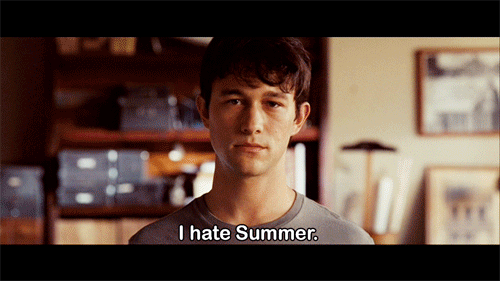So, when that doesn't please me, I go back to one of my favorite pictures: Woody Allen's 1977 masterpiece Annie Hall. Despite his frequent claims that the movie was not autobiographical, there's so much in the movie that feels personal and self-reflective that nearly everybody who sees the picture thinks of it as a record of what went right and what went wrong on Allen's relationship with co-star Diane Keaton. It stands as a landmark also in that it won Best Picture of 1977, very well deserved I'd say.
Granted, I'm barely 20 years old as it is. As much as I love the picture and relate to certain circumstances, it's not outright for my generation. The world moves on and people's approaches to their own lives change. So, enter 2009, when a semi-independent feature called (500) Days of Summer comes out and becomes a sleeper hit, more so cementing the already on the rise stars of Joseph Gordon-Levitt and Zooey Deschanel (daughter of Satan) as they give an honest critique to the hopeless romanticism of most 'sensitive' males of today and the consequences of holding one's feelings against him/herself.
Now, cinematically (given that this is a movie blog first and foremost), the pictures have a different address to their subject matter largely centering on their editing techniques. (500) Days of Summer is a nonlinear narrative, the form of connection between events being portrayed by a countdown of the titular days in which Tom Hansen (Gordon-Levitt) finds himself involved with Summer (Deschanel). Annie Hall is a bit more (from what I understand, somewhat inadvertently) auteur-esque and especially neurotic rather than social and takes the narration upfront as an introspect from Alvy himself (Allen) as he goes through the motions with Annie (Keaton). There are a few moments of nonlinear but the narrative is largely flashback. In any case, both pictures are style-driven, utilizing homage, musical numbers, animated sequences, juxtaposition and other contemporary devices to communicate towards the audience their theses on romance in their respective settings.
But the content, what they each say, is where we really find the differences between the two separate worlds Allen and Webb's lives inhabit. For a large example, both pictures establish that the male leads had developed their unusual perspective on love from their childhood, however, only Annie Hall really digs deeper than just a superficial influence from another work of art. Almost as a tag-along factor to this, we learn about the world Alvy grew up in, how he molded into the person he is: an uncertain, wary individual who is not too tightly wound to experience the world, but too apprehensive to his experiences to feel pleasure from them (appropriately, a working title of the picture was Anhedonia, the inability to experience pleasure). We learn about his extensive family with only one other main companion to follow him on his self-reflective journey, played by Tony Roberts.
Tom Hansen, at the beginning of his picture, is not uncertain. In fact, it takes a while for him to learn to sort of watch out where he steps (and if you consider the very end of the picture's jokes, he still doesn't truly learn yet). But for all intents and purposes, he is certain that true love is everything, that everybody has one person out there for him and that Summer is that one. We don't see his family much; in fact, there is no parental guidance, like most of the real world has experienced. Perhaps, it was never thought of as, strictly speaking, Tom is an adult with a career, but one would find it quite odd that he does not have an contact with a father or mother figure at all throughout the picture. The only immediate family is his incredibly mature-beyond-her-years little sister (Chloe Grace Moretz). Instead, Tom's friends, a rarity in a person who has had his girlfriend a long yet apparently pleasantly stable time (portrayed by Matthew Gray Gubler) and a wreck with the ladies (portrayed by Geoffrey Arend).
Both leads take their friends' advice with a grain of salt, largely because they think of them as too far from the norm to be taken seriously. Worse more so, at least in the sense of (500) Days of Summer, our guides into this world of theirs get too invested in their romantic interests. Summer outright states she wants a purely physical relationship. Tom gives the sign that he gets it, but while the movie continues and continues, he clearly doesn't. He's wanting to force out more from her. In fact, once they stop seeing each other, Tom crashes from his high and lands burning when Summer has found somebody else and takes him a lot more seriously than she ever did with him. Annie Hall has the moment when Alvy and Annie realize that they probably aren't right for each other and as such, they simply agree to break off. But Alvy is the one who comes running back, wanting a sign that they can still be together, only to be turned down and arrested...
... sorry but the Annie Hall scenario actually seems to similar to what happened to me a couple of nights. >.> Huh... that was embarrassing.
What makes Annie Hall so painful for Alvy though is the amount of things they went through together. How they stuck around to keep each other company, how Alvy came out of his shell for a bit, they met each other's families, they learned about each other, they talked and they walked and they cooked lobsters and they ran away from spiders 'the size of a Buick'. And then it was over. That seems at first to be the way it looks through the minds of many who come out of a breakup, particularly the one who hears it happen to him. Where did it go wrong?
Note: If anybody can find and send me the link to a gif of this clip
I will owe you SOOOOO MUCH.
But, as Hansen's little sister suggests in the more modern picture, when someone looks back, things weren't entirely perfect as it seemed when you were on that romantic high. There were huge differences between characters, there were subtle moments of pulling away. You can appreciate the many great moments that happened to the two of you. But you can't just pretend it was all rainbows and sunshine. That's not the case.
However, by the end of it, despite their significant generational differences, the movies have a coming to terms with both characters from their new position. Annie Hall more poignantly puts this bittersweet situation with a joke, the fact that perhaps we do need such close people in our lives every once in a while, however hard it is to break apart from them afterward. More will come and you will eventually reach a point when your happiness may or may not ever go away... but just keep going....
I think it'd also considerable that Zooey's character is the anti-theses to Gordon-Levitt's character in (500) Days of Summer. She's both the love interest and the antagonist. She doesn't believe in love. She doesn't think it exists. She seems to be winning this battle of beliefs all throughout this movie with Tom, I honestly thought that Tom was going to end up killing himself at the end of the picture. And then she is put in her place when love strikes her. Just not with Tom. While (500) Days of Summer might actually seem muddled and bipolar at first viewing with its message to the audience due to its currently unconventional method of narrative, it's actually pretty straightforward. And it's enjoyable. And you hopefully leave the movie feeling good.
As such, Alvy's final lines from Annie Hall...
Both movies are great in their own right, as commentary and as comedies. They're extremely funny with breakout lead performances from Allen and Gordon-Levitt (Granted, one could claim that Allen cheated a bit), Keaton and Deschanel and the rest of their comapny. And the editing style of both pictures are a great jumping point when you're trying to learn the most effective ways to tell a story through the cutting and editing board (among the works of Eisenstein and the Coen Brothers). But the script, while both have some flaws to them (again, Annie Hall was sort of just jumbled together for the story), are the heart and give the movies their continuous wisdom.
Marc Webb (pre-The Amazing Spider-Man) and Woody Allen have done well.
I personally award Annie Hall 9.5/10 (I'm biased - its one of my favorite movies), while (500) Days of Summer gets a 8.5/10 (I'm biased - one of my previous roommates kept playing that movie continuously; it was his favorite). I recommend them more and more I talk about them so go see them both. I'd also like to recommend the soundtrack to (500) Days of Summer, is pweddy goo.
Finally, a non-00 movie! Goddammit...




No comments:
Post a Comment